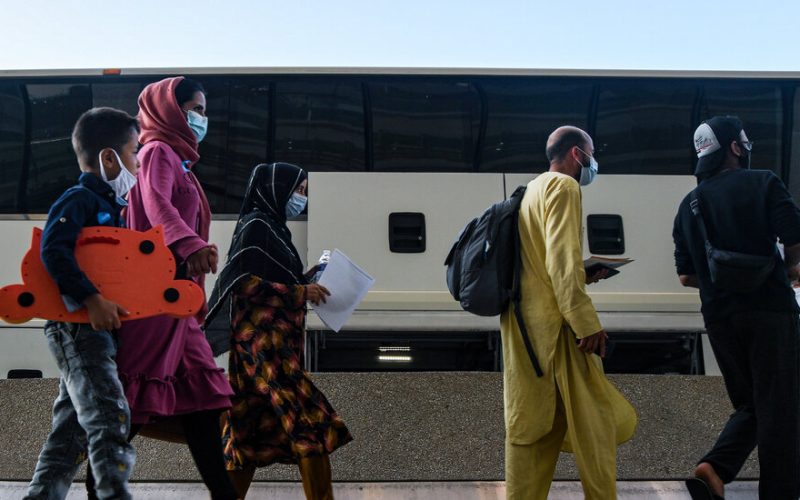An executive order signed by President Trump on Monday that suspends refugee admissions to the United States puts at risk thousands of citizens of Afghanistan who helped the American mission during the war there, the president of a California-based resettlement group said.
The order would affect not only scores of Afghans who are now in hiding from the Taliban’s repressive rule, but also family members of active-duty U.S. troops, said Shawn VanDiver, the president of AfghanEvac, a coalition of more than 250 organizations helping to resettle Afghans who worked with the Americans before the U.S. withdrawal in 2021.
The order amounts to “another broken promise” by the United States, Mr. VanDiver said by email. It “risks abandoning thousands of Afghan wartime allies who stood alongside U.S. service members during two decades of conflict,” he added.
Mr. Trump’s order, titled “Realigning the United States Refugee Admissions Program,” is set to take effect next Monday. It does not specify when the suspension will end, saying that it will continue “until such time as the further entry into the United States of refugees aligns with the interests of the United States.”
Refugee programs have historically been a point of pride in the United States, reflecting its ambition to be seen as a leader on human rights. The president has usually made an annual determination about how many refugees to let into the country in any given year.
After the U.S. military’s chaotic retreat from Afghanistan as the Taliban took power, the Biden administration launched Operation Allies Welcome, allowing 76,000 evacuated Afghans to enter the United States for humanitarian reasons, according to the Washington-based Migration Policy Institute.
As of 2023, more than 90,000 Afghans had settled in the United States, according to statistics cited by Mustafa Babak, an advocacy and resettlement expert with the Emerson Collective. But U.S. refugee agencies had been bracing for the admissions program to be gutted since Mr. Trump won the November election.
During his first term as president, Mr. Trump signed an executive order barring people from six Muslim-majority countries from entering the country. He slashed the annual U.S. refugee cap; in 2020, the final full year of his term, the United States admitted a record low number of refugees, about 11,000. The move left thousands of refugees stranded in camps in Kenya, Tanzania and Jordan.
Joseph R. Biden Jr. revived the program after becoming president in 2021. In the fiscal year that ended on Sept. 30, 2024, about 100,000 refugees arrived in the United States, the most in nearly three decades, records show.
After Mr. Trump declared his candidacy for the 2024 election, a conservative policy blueprint called Project 2025 suggested that he would cite the record number of migrant crossings at the southern border during the Biden administration as a justification for halting refugee resettlement.
The suspension of refugee admissions was one of a blizzard of executive orders signed by Mr. Trump within hours of his swearing-in on Monday. Other orders cracked down on illegal immigration and ended the U.S. program that allowed migrants from Cuba, Venezuela, Haiti and Nicaragua to enter the United States for up to two years if they had a financial sponsor and passed security checks.
The refugee order states, “Over the last four years, the United States has been inundated with record levels of migration, including through the U.S. Refugee Admissions Program (USRAP). Cities and small towns alike, from Charleroi, Pennsylvania, and Springfield, Ohio, to Whitewater, Wisconsin, have seen significant influxes of migrants. Even major urban centers such as New York City, Chicago, and Denver have sought federal aid to manage the burden of new arrivals.”
But Mr. VanDiver said surveys had shown strong support among the American public for the continued relocation and resettlement of Afghan allies.
He noted that people vetted under the U.S. Refugee Admissions Program entered the country “only after receiving a government or U.S. run nonprofit referral and after undergoing extensive service verification, background checks, medical screening and rigorous security vetting.”
Now, he said, Mr. Trump’s executive action will plunge thousands of Afghan refugees into limbo by freezing all cases where they stand and preventing Afghans from boarding flights to the United States. He said another executive order by Mr. Trump — about protecting the country from “foreign terrorists and other national security and public safety threats” — had provisions that could further affect Afghan nationals seeking refuge in the United States.
Mr. VanDiver said his coalition, which works to secure special visas for Afghans who assisted the U.S. mission, had sent a letter signed by more than 700 people, including veterans and civilians who worked in Afghanistan, “urging the administration to exempt Afghan allies from this pause.”
Among those who could be shut out are “family members of active duty DoD service members and partner forces who trained, fought and died alongside U.S. troops,” Mr. VanDiver said, referring to the Department of Defense.
“Failing to protect our Afghan allies sends a dangerous message to the world: that U.S. commitments are conditional and temporary,” he said. “This decision undermines global trust in our leadership and jeopardizes future alliances.”








